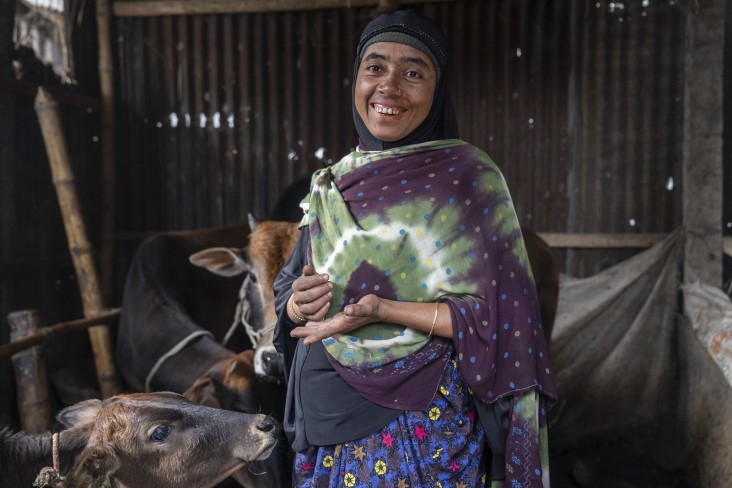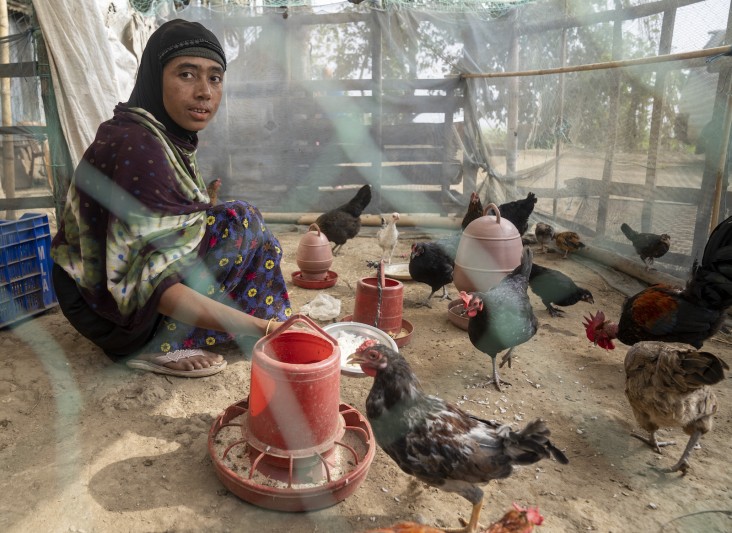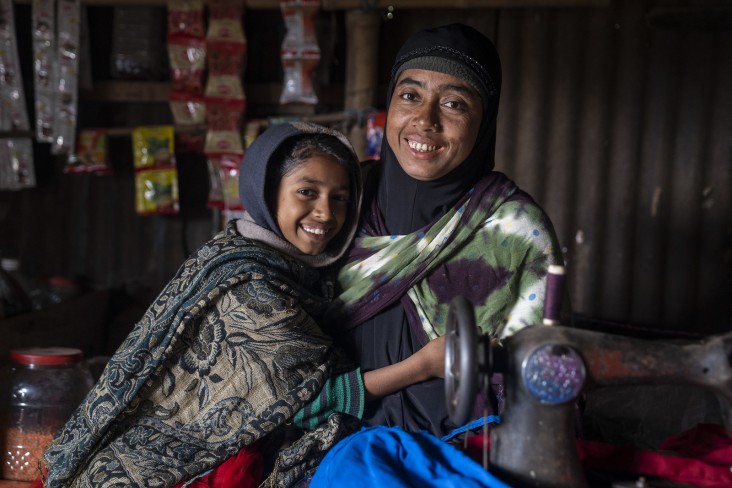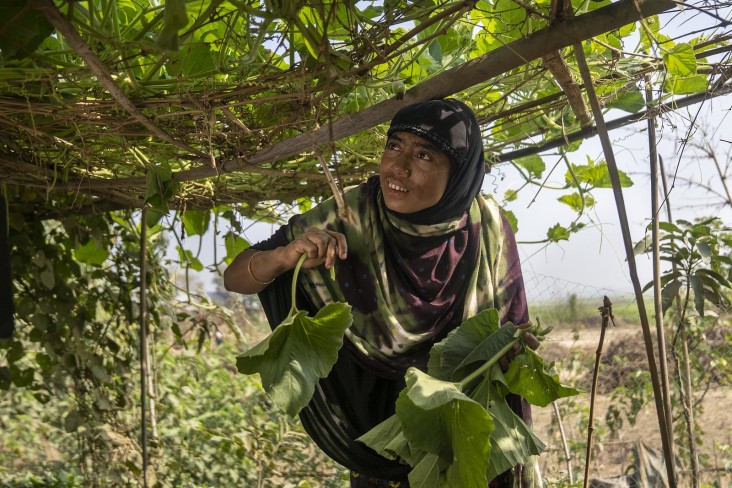Speeches Shim

USAID helps make it a good haor day in Bangladesh
“Now I feel I have my own identity. Now that I can contribute something to the family, I feel empowered.”
- Tahmina Begum
Haor: In Bangla, a bowl or saucer-shaped depression and wetland.
In northeast Bangladesh, up near the border with India, you find a mosaic of habitats: rivers, streams and irrigation canals, large areas of seasonally flooded cultivated plains and hundreds of wetlands with still water. Large areas are covered by wetlands that between May to October transform into massive bodies of deep water.
It is uniquely beautiful here, even picturesque—but it is not an not easy place to live and nurture a family. Just ask Tahmina Begum, a wife and mother caring for her large family in the village of Birnagar. She could tell you what it feels like to stare down an impending disaster when the rains come. Wind whips wildly and water gushes from nearby mountains, generating waves in the wetlands when the haor is full that in turn surround and erode the raised mounds of earth—called atis—upon which people live.
Just imagine how life gets difficult for Tahmina’s community in the summer monsoon season: Rushing flash floods come as early as March, ruining standing crops, causing landslides, and eroding away the atis, where neighbors crowd together to weather the storms. As roads are submerged in water, transport and communications costs soar as haor residents have to ply the waters by boat or trawler.
There is also very little rainfall in dry periods, followed by increased river flow and flooding during monsoons. Health workers report significant increases in cases of cholera, diarrhoea, skin diseases and tuberculosis. Conditions over the last decade have been particularly extreme, forcing vulnerable poor families to resort to drastic measures, such as early marriage for girls and boys, selling land and other assets, withdrawing children from school to work, and eating less.
The challenge of making ends meet forces most families to send spouses or children to larger towns to find work as daily wage laborers. During the rainy season the whole area turns into a vast body of water, and a huge treasure trove of fish. Men and boys who stay on the ati turn to fishing, a life-saving income source for many people. However, earning a living this way is tough, too, as fishing in the haor region may require paying money or giving a share of the catch to landowners to obtain informal fishing rights.

Life improves somewhat in the winter when water in the haor recedes. Farming then becomes a major activity, with most people taking up rice sharecropping, farm daily wage labor, or other types of daily wage labor such as earth moving as wealthier households invest in restoring eroded atis. Others make a living in transportation, ferrying people across the remaining water bodies.
Winter brings its own set of problems, however. Poor communication limits access to markets and opportunities to increase production. There is precious little space in the cramped island settlements to maintain livestock or carry out other home-based enterprises. Low agricultural productivity limits farming incomes and the demand for farm wage labor is also low outside peak harvest seasons. Land ownership is skewed in favor of larger holdings: 26 percent of farmers who have over 2.5 acres of land operate and manage 65 percent of the land in the haor region.
Yet, the enterprising families living in the haor region have hope. Tahmina embodies it. Through much hardship, Tahmina went way beyond just making the best of her lot in life—she has stepped up and become an inspirational influencer in her village. Overcoming poverty and a lack of support from her in-laws as she struck out to earn more income when her husband fell ill, she has become independent through sewing, poultry, and cattle raising. And her star-pupil daughter, now with a scholarship in hand, aspires to become a teacher to help girls and boys just like her.
It is not that easy for women like Tahmina, who for a long time have been told by men to leave school early, get married, and stay at home from a young age to cook and start or care for a family. Most women cannot own land in these areas, and are not allowed to venture out into the community to work. That’s why what Tahmina has achieved is so remarkable.
Before she had contact with the project, she stayed home and took care of the family, including her husband, who has been sick and too sick and too weak to work in the fields or take on other strenuous jobs. She sewed bedsheets for others and worked in other households to earn money.
“If my husband brought in money we would eat,” Tahmina said. “If he did not, then we would eat just one meal a day. We would all be dependent on one person—the man of the house.”
Things started to change rapidly, however, after a survey in her village identified her “poor.” This classification opened up doors for training under USAID's Strengthening Household Ability to Respond to Development Opportunities project, implemented by CARE. The project improves gender equitable food and nutrition security and resilience of vulnerable people living in Bangladesh's haor and char (low-lying areas surrounded by water, often river islands).
Tahmina took full advantage of everything on offer. She received seven days of training in tailoring, an off-farm income-generating activity, as well as life skills training which helped her develop a business plan for her sewing business. The project helped jumpstart that plan by providing 3,000 taka (about $36), and she added another 1,000 taka from her savings to buy a sewing machine, which she now uses in her home. Whatever she earns from making clothes she invests in poultry. She is making good personal use of valuable livestock vaccination training for her flock of chicken and her own three dairy cows; she plans to generate additional income as a vaccinator on household farms nearby.
After receiving 30 months of food support for her youngest son, including of wheat, vegetable oil, and lentils, she joined the food distribution committee to help other families. It is just one of many ways she is giving back to her community. Here are a few more: Trained in financial management, Tahmina is a village savings and loan association group leader. After three days of training, she is now a village development committee leader and household name among local officials and neighbors alike. A member of a local committee to prevent violence against women, she rallies others to report incidences of violence and child marriage, and because of her village development committee status, can raise unsolved problems with local authorities and approach law enforcement officers to investigate.
It doesn’t stop there. She has even more influence and visibility in her role as a parents’ representative in the local primary school committee, where she champions good living and studying conditions for children in the community.
Despite all the praise, Tahmina does not draw a lot of attention to herself when explaining her life and work. She prioritizes others, starting by caring for her sick husband and ensuring that her six children finish their education and “end up in a secure and good place.”

Seeing her success, Tahmina’s neighbors readily seek her out for advice on how she manages funds and makes money while still finding time to care for a family and run a household. “A lot of women come to me,” she said. “They are mostly distressed about their children not being physically well, or they are not able to work. I tell them that hard work always pays off. ‘If I can get out of my difficult situation, you can do it, too, but you have to put in your hard work. You can learn how to do the work from me, but you have to manage your time well and work hard.’”
Aware of her good communications skills, some neighbors approached her about sanitation problems in the village. Tahmina took that problem, carried it forward with a solution in mind, and persuaded local government officials to construct several latrines. She also helped a group of unemployed mothers and widows register for community social safety net allowances to help them make ends meet.
Tahmina’s down-to-earth nature inspires, and draws a great deal of attention and praise. “She is a woman of the soil. She is very helpful and patient with others,” said neighbor Rina Begum, who took Tahmina’s advice on how to scale-up her small coop of chicken into a bigger flock. She succeeded, adding a cow as well.
Another neighbor, Musammat Sadika, learned tailoring skills from Tahmina and is now making more money. “Whatever Tahmina does, she does it nicely, and never fails to complete it,'' she said, adding: “The most important thing about her is her can-do attitude. She treats everyone equally. She is a very loving and caring person who does not neglect anybody. She is always willing to do things to help others.”

In five years, Tahmina wants to help her children finish their education and start a class where she can train other people in tailoring skills. She also plans to expand her small house for her family and spruce up her roadside tea stall where many people stop for a cup of tea or stock up on bananas, biscuits, and bread on the road by her house.
Having come a long way since receiving financial support and training from USAID and CARE, Tahmina is one of over 5,000 people trained in Tahipur sub-district and nearly 384,000 total in Bangladesh. The support she received was a sea change amidst the high waters: She realized for the first time she was able to do something on her own. “Now I feel I have my own identity,” she said. “Now that I can contribute something to the family, I feel empowered.”
Story by Richard Nyberg for USAID

Comment
Make a general inquiry or suggest an improvement.